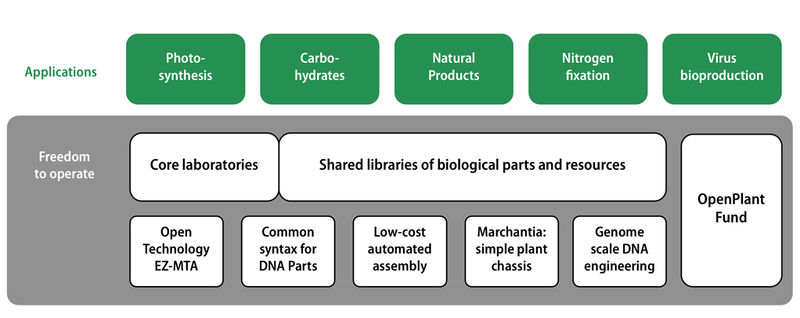OpenPlant: Difference between revisions
mNo edit summary |
m (→Links) |
||
| Line 9: | Line 9: | ||
==Links== | ==Links== | ||
* | * [http://openplant.org/ OpenPlant Website] | [http://openplant.org/blog/ OpenPlant Blog] | Twitter: https://twitter.com/@_OpenPlant | ||
* [http://openplant.org/blog/2015/05/open-source-hardware-development-method-open-source-ecology/ Open Source Hardware Development Method | Open Source Ecology] | * [http://openplant.org/blog/2015/05/open-source-hardware-development-method-open-source-ecology/ Open Source Hardware Development Method | Open Source Ecology] | ||
Revision as of 13:50, 6 August 2016

OpenPlant is a BBSRC / EPSRC Synthetic Biology Research Centre, supported by the Research Councils' Synthetic Biology for Growth programme. The initiative promotes interdisciplinary exchange, open technologies for innovation and responsible innovation for sustainable agriculture and conservation.
Synthetic Biology offers the prospect of reprogrammed biological systems for improved and sustainable bioproduction. While early efforts in the field have been directed at microbes, the engineering of plant systems provides even greater potential benefits. In contrast to microbes, plants are already globally cultivated at extremely low cost, harvested on the giga-tonne scale, and routinely used to produce the widest range of biostuffs, from fibres, wood, oils, sugar, fine chemicals, drugs to food. Plants are genetically facile, and GM plants are currently grown on the >100 million hectare scale. Plant systems are ripe for synthetic biology, and any improvement in the ability to reprogram metabolic pathways or plant architecture will have far-reaching consequences.
Comment (Rasmus)
Really interesting would be projects dealing with duckweed or azolla - plants that are very easy to grow as part of an integrated agriculture system (example: omega-3 fatty acids).
Links
- OpenPlant Website | OpenPlant Blog | Twitter: https://twitter.com/@_OpenPlant
- Open Source Hardware Development Method | Open Source Ecology
